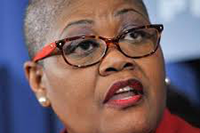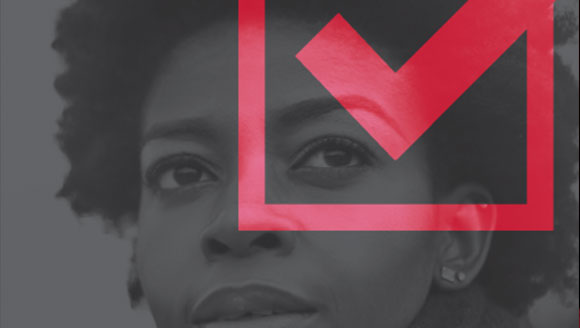Rewriting the Code: Black Women Lead the Fight for Digital Justice and Diversity in Tech
 Melanie L. Campbell
Melanie L. Campbell
President & CEO, National Coalition on Black Civic Participation; Convener, Black Women’s Roundtable
Twitter: @coalitionbuildr
Black women are making indelible marks in the technology industry as leaders, entrepreneurs and influencers in the nation’s digital economy and are leading advocates for digital justice. From government to business, public interest to grassroots organizing—Black women are making a significant impact in changing the face of tech from a “white-males only club” to one that reflects and embraces the disruptive innovation that diversity and inclusion brings to the industry. In the tech policy arena, Black women are staunch advocates and influencers on Capitol Hill, the Federal Communications Commission, Silicon Valley, and city halls across the country. In the political arena, Black women in government leadership recognize the transformative power that technological access, inclusion and entrepreneurship, affordable broadband, and other means of communications have in increasing the economic power of the Black community and the nation.
One of the most powerful Black women leaders in government forging tech agendas and initiatives is former Federal Communications Commissioner Mignon Clyburn. Commissioner Clyburn consistently crafted FCC policies to provide equal technology access and inclusion to all consumers. Commissioner Clyburn’s many policy initiatives included expanding affordable broadband access to low-income and underserved consumers, ensuring that internet content is equally accessible to consumers (net neutrality) and eliminating the exorbitant phone rates imposed on consumers who communicate with their incarcerated family members.[1]
In local government, Mayor Muriel Bowser is leading the way to diversify the tech industry in the District of Columbia by establishing the Inclusive Innovation Incubator (In3), a partnership between D.C. government and Howard University to increase tech innovation among the diverse communities throughout the District as it expands its tech economy.[2]
In policy shops and news outlets, there are Black women policy experts who are driving research and advocacy. They are also leading public awareness around laws, policy, and industry practices that are being adopted—from issues of diversity and inclusion in the digital economy to creating economic growth for the Black community, and our nation, and impacting the international competitive advantage for the U.S. in the global digital economy. Here are a few of those tech policy gurus impacting tech policy everyday:
-
Maurita Coley Flippin, interim president and CEO of Multicultural Media, Telecom & Internet Council: Coley advocates for equal opportunity and civil rights in the media, telecommunications, and tech industries. Her work includes advocating with U.S. legislators, federal regulators, and the courts for laws and policies that promote equal access to technology and inclusion in all facets of technological employment and entrepreneurial opportunities for minorities.[3]
-
Kristal High, co-founder and editor-in-chief of Politic365: High provides opinion and policy commentary from the perspective of people of color. Politic365 provides a venue to inform elected officials and community leaders about issues and policies that are important for the empowerment, enrichment, and education of people of color.[4]
-
Nicole Turner-Lee, Ph.D., fellow, Center for Technology Innovation, Brookings Institution: Dr. Turner-Lee’s work is focused on researching public policy designed to enable equitable access to technology across the U.S. She is a sought-after expert on the intersection of race, wealth, and technology within the context of civic engagement, criminal justice, and economic development.[5]
-
Joycelyn Tate, managing director of Tate Strategies and the co-founder of MakeIT4Change Innovation Hub: Tate is a policy advocate and strategist for laws and policies that advance entrepreneurial and employment opportunities for women and minorities in the tech sector. She advocates at the U.S. Congress and federal regulatory agencies. The MakeIT4Change Innovation Hub is an organization that provides creative space and resources for youth and adults to develop tech products for social change.[6]
In Silicon Valley, there is a new cohort of Black women leaders who are bringing unique civil rights and social justice backgrounds to the fight to challenge the tech industry and make the business case for diversity and inclusion. A few of those innovators include:
-
Jotaka Eddy, vice president of policy, strategic engagement and impact at LendUp: Eddy leads LendUp’s regulatory, legislative, and social impact initiatives. She measures how LendUp’s products benefit consumers in areas such as savings on interest rates and fees. She also previously served as the Special Assistant to the President and CEO of the National Association for the Advancement of Colored People.[7]
-
Chanelle Hardy, Esq., director of strategic outreach and external partnerships at Google: Hardy’s work is focused on building connections between Google and organizations doing innovative, tech-savvy policy work in racial and social justice and consumer advocacy. Prior to joining Google, Hardy served in senior positions on Capitol Hill in the Obama Administration and at the National Urban League.[8]
In the fight for digital justice, Black women leaders are highly sought after to assist companies that want to address issues of racial bias and discrimination. In 2016, Airbnb hired Laura Murphy, a civil rights leader and civil liberties expert, to advise them after the damaging results of a Harvard University study and increasing complaints from Airbnb users of color who complained of racial bias and discrimination within the platform. Murphy successfully helped Airbnb update its policies and lead its efforts against discrimination. [9]
Black women are not only taking on the battle for digital justice, they are driving digital advocacy as a key organizing tool. The #BlackLivesMatter (BLM) hashtag and BLM movement were created in 2013 by three Black women, Alicia Garza, Patrisse Cullors, and Opal Tometi, in response to the unjust killing of Travyon Martin and the subsequent acquittal of his murderer. [10]
These are just a few of the Black women leading the charge for digital justice, advocacy, diversity, inclusion, and economic opportunity in the tech industry. Their dedication and leadership is opening doors of opportunity in the digital economy and cracking the double paned glass ceiling faced by all marginalized communities.
[1] Mignon Clyburn, Commissioner; Federal Communications Commission, accessed April 14, 2018.
[2] Office of the Deputy Mayor for Planning and Economic Development, DC’s First Inclusive Innovative Incubator Officially Opens, accessed April 14, 2018. https://dmped.dc.gov/release/dc%E2%80%99s-first-inclusive-innovation-incubator-officially-opens
[3] Maurita Coley, LinkedIn.com, accessed April 14, 2018, https://www.linkedin.com/in/mauritacoley
[4] Kristal Lauren High, Politic365, accessed April 14, 2018, http://politic365.com/about/kristal-lauren-high/
[5] Nicol Turner-Lee, Brookings, accessed April 14, 2018, https://www.brookings.edu/experts/nicol-turner-lee/
[6] Joycelyn Tate, LinkedIn.com, accessed April 14, 2018, https://www.linkedin.com/in/joycelyntat
[8] Congressional Hispanic Caucus Institute, accessed April 12, 2018 https://www.chli.org/chanelle-hardy/.
[9] Charli Penn. Essence.com, published December 5, 2016. https://www.essence.com/lifestyle/travel/black-woman-laura-murphy-civil-rights-airbnb-discrimination
[10] BlackLivesMatter.com, accessed April 12, 2018. https://blacklivesmatter.com/about/herstory/


 Equality Index
Equality Index  Senate Report
Senate Report  2020 SOBA Essays
2020 SOBA Essays  2019 Report
2019 Report 